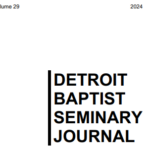Pietism & Conflict
Some bad effects of the pietistic heritage of fundamentalism and evangelicalism tend to make conflicts worse:
An all-or-nothing view of people and ministries. A misguided view of spirituality affects how others and oneself are viewed. Being “wrong” on some issue is viewed as a spiritual problem, and being “right” is often treated as if it comes from a closer walk with God. This can end up with both sides infected with pride and judgmentalism. It is hard to solve problems when both sides think being right with God means you can’t be wrong.
A faulty view of the conscience that misunderstands how it works and what it signifies. A clean conscience doesn’t guarantee we are not in the wrong, only that we are sincere. People are often sincerely wrong.
Confusing apparent “blessing” with divine approval. Couple this with a false claim like “God doesn’t use dirty vessels,” and it produces a dangerous brand of self-righteous pride. “Look how God is blessing, so He must be on our side in this conflict!” But Scripture is filled with people who were blessed in spite of themselves. Blessing is proof of God’s gracious character, not necessarily an endorsement of ours.
Disregard for biblical principles of due process because of supposed spiritual insight. These include principles like: (1) understanding before judging, (2) hearing both sides of a dispute before drawing conclusions, and (3) the need for 2–3 witnesses to back accusations. All these tend to be set aside because of the pietist’s “closeness to God.”
Most conflicts among believers are not as clear-cut, as one side is wrong about everything, and the other is right about everything. And being right isn’t about who is more spiritual. Apparent blessing is not a validation of one side in the conflict since both sides usually claim it. “Spiritual insight” doesn’t set aside biblical truth; it follows it.
So, when someone wants you to join their team in a conflict, ask yourself: (1) Are they painting this as a battle between the good guys and the bad guys? (2) Are they presenting themselves as the ones who are more spiritual than the others, and convinced of that because their consciences are clear about what they are doing? (3) Are they bolstering their position by some measure of apparent blessing or success (“look at how God is pulling things together for us”); and/or (4) are they setting aside biblical due process by calling you to make judgments on the other side without all the facts?
A better route: View problems as springing from divergent views and goals rather than jumping to the conclusion that someone disagrees because they are ungodly or unspiritual.
A better approach: Assume (until proven otherwise) that the folks on the other side are operating in good conscience, too.
A better standard for decision-making than apparent blessing is found in the Word because the thing that is required in stewards is faithfulness. So, focus the discussion on what the Word actually says and how it relates to the issues at hand.
A better process: Learn the details and history of the conflict before making conclusions. Only allow and receive accusations against people on the basis of two or three witnesses. Dismiss hearsay. Reject calls to condemn individuals and entire groups of people without hard, plain proof.
It would be nice if every conflict were clearly a battle between the good angels and the demons. The reality, though, is that in a broken world, even the best of believers still struggles with his or her own brokenness—ranging from the sinless infirmities of our fallen condition to the subtle deceits of sin that wage war on our souls. Too often, problems that could be solved turn into conflicts that split churches and destroy ministries because one or both sides assume they live above these infirmities and iniquities.
“By insolence comes nothing but strife, but with those who take advice is wisdom” (Proverbs 13:10).




Excellent article filled with biblical wisdom. False conclusions/judging motives has destroyed many relationships and harmed or split many churches. I’ve seen it. Will give this article wide and long use in the years to come. Thank you!